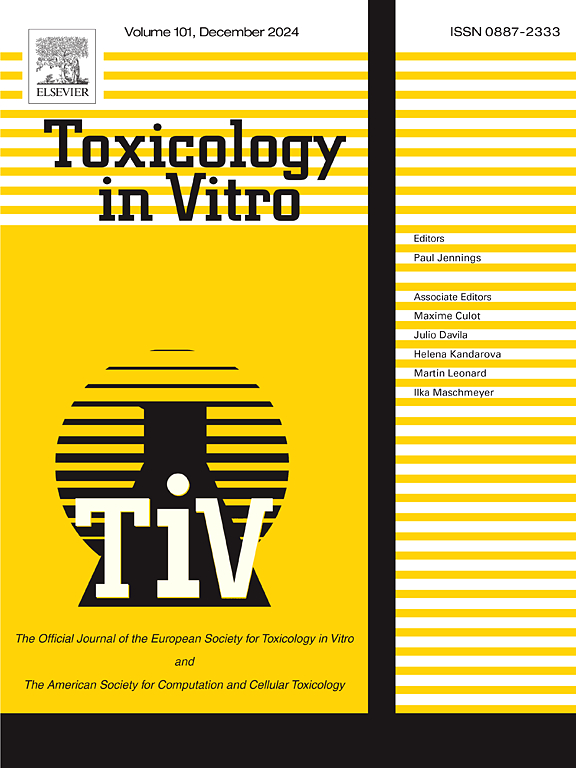Dihydrotanshinone I induces necroptosis and cell cycle arrest in gastric cancer through the PTPN11/p38 pathway
IF 2.6
3区 医学
Q3 TOXICOLOGY
引用次数: 0
Abstract
In this study, MTT assays, apoptosis detection, immunofluorescence, and functional studies were used to elucidate the mechanisms underlying the effects of dihydrotanshinone I (DHT) on gastric cancer cells. Drug target prediction and analysis were conducted to identify potential targets of DHT. MTT assay revealed significant inhibition of AGS and HGC27 cells by DHT. Morphological changes, including nuclear shrinkage and the induction of necrotic cell death, were observed in DHT-treated gastric cancer cells, along with cell cycle arrest at the G2/M phase. Further analysis revealed potential targets of DHT, including PTPN11, which is highly expressed in gastric cancer cells. DHT treatment increased necrosis-related proteins (RIPK1/RIPK3/MLKL) and downregulated cell cycle-related proteins (CDC25C and CDK1) levels in gastric cancer cells. After DHT treatment, PTPN11 protein expression decreased. Furthermore, DHT significantly increased the phosphorylated p38/JNK protein level, with the phosphorylated p38 protein notably enriched in the nucleus. These functional studies indicate that PTPN11 plays a key role in mediating the effects of DHT, including cell cycle regulation and necrosis induction. In conclusion, PTPN11 is a central target through which DHT affects gastric cancer cells, regulating downstream pathways involved in necroptosis (p38/RIPK1/RIPK3/MLKL/JNK) and cell cycle arrest (p38/CDC25C/CDK1).
二氢丹参酮 I 通过 PTPN11/p38 通路诱导胃癌坏死和细胞周期停滞
本研究采用 MTT 试验、细胞凋亡检测、免疫荧光和功能研究来阐明二氢丹参酮 I(DHT)对胃癌细胞的作用机制。研究人员进行了药物靶点预测和分析,以确定 DHT 的潜在靶点。MTT实验显示,DHT对AGS和HGC27细胞有明显的抑制作用。经 DHT 处理的胃癌细胞发生了形态学变化,包括细胞核缩小和诱导细胞坏死,同时细胞周期停滞在 G2/M 期。进一步分析发现了 DHT 的潜在靶点,包括在胃癌细胞中高表达的 PTPN11。DHT处理增加了胃癌细胞中的坏死相关蛋白(RIPK1/RIPK3/MLKL),并下调了细胞周期相关蛋白(CDC25c和CDK1)的水平。经 DHT 处理后,PTPN11 蛋白表达量减少。此外,DHT 能明显提高磷酸化 p38/JNK 蛋白水平,磷酸化 p38 蛋白明显富集在细胞核中。这些功能研究表明,PTPN11 在介导 DHT 的作用(包括细胞周期调控和坏死诱导)中发挥着关键作用。总之,PTPN11 是 DHT 影响胃癌细胞的中心靶点,它调节参与细胞坏死(p38/RIPK1/RIPK3/MLKL/JNK)和细胞周期停滞(p38/CDC25c/CDK1)的下游通路。
本文章由计算机程序翻译,如有差异,请以英文原文为准。
求助全文
约1分钟内获得全文
求助全文
来源期刊

Toxicology in Vitro
医学-毒理学
CiteScore
6.50
自引率
3.10%
发文量
181
审稿时长
65 days
期刊介绍:
Toxicology in Vitro publishes original research papers and reviews on the application and use of in vitro systems for assessing or predicting the toxic effects of chemicals and elucidating their mechanisms of action. These in vitro techniques include utilizing cell or tissue cultures, isolated cells, tissue slices, subcellular fractions, transgenic cell cultures, and cells from transgenic organisms, as well as in silico modelling. The Journal will focus on investigations that involve the development and validation of new in vitro methods, e.g. for prediction of toxic effects based on traditional and in silico modelling; on the use of methods in high-throughput toxicology and pharmacology; elucidation of mechanisms of toxic action; the application of genomics, transcriptomics and proteomics in toxicology, as well as on comparative studies that characterise the relationship between in vitro and in vivo findings. The Journal strongly encourages the submission of manuscripts that focus on the development of in vitro methods, their practical applications and regulatory use (e.g. in the areas of food components cosmetics, pharmaceuticals, pesticides, and industrial chemicals). Toxicology in Vitro discourages papers that record reporting on toxicological effects from materials, such as plant extracts or herbal medicines, that have not been chemically characterized.
 求助内容:
求助内容: 应助结果提醒方式:
应助结果提醒方式:


